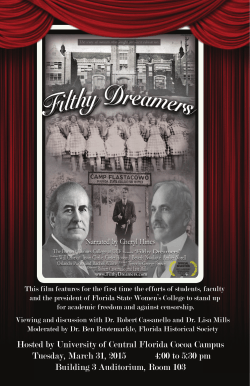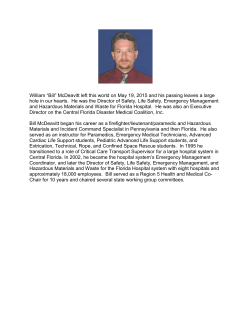
MSP Newsletter Final - Science4Inquiry.com
MSP Project IN THIS ISSUE The K-12 Math & Science Partnership of Osceola, Okeechobee, and Volusia Counties, Louisiana State University, and University of South Florida, is a three-year grant project, funded by the Florida Department of Education, designed to increase the academic achievement of students in middle and high school science. The focus of the project includes developing and implementing technology-supported science inquiry lessons and assessments for earth, life, and physical sciences to improve student learning.. MSP Project A new website was developed and launched in March 2015 to support and promote the MSP project. The website, Science4Inquiry.com, is designed to be a repository for MSP project information, upcoming workshops, lesson plans, teaching resources, technology resources, and other activities. It also hosts a community discussion board designed speci�ically for MSP teachers and partners, and will eventually host science inquiry-based games and simulations for students. Participant Feedback MSP Website MSP Website March Workshop Workshop Highlights http://science4inquiry.com March Workshop On March 2nd, twenty-six teachers and district leads from Osceola, Okeechobee, and Volusia County schools arrived at the University of South Florida’s to participate in a 3-day workshop dedicated to inquiry-based science teaching and learning in earth, life, and physical sciences. The eager participants were joined by Dr. Yiping Lou and Dr. Luanna Prevost from the University of South Florida, as well as Dr. Pamela Blanchard from Louisiana State University. Much time and preparation went into planning an engaging and informative series of lessons and activities that were delivered over the next three days. Do you know the 5E s ? Engage Explore Explain Elaborate Evaluate Newsletter volume 1. March 2015 I N THIS I SSUE oc k s ... O h m y ! R d n a , s e k a n S E a g le s , a n d Work s hop H i g h l i g h t s Day One Day one began with an overview of the Math & Science Partnership, the new Science4Inquiry project website, and an evaluation of the participants’ past experience with inquiry-based science teaching, using the Pathways to Inquiry (PTI) Inquiry Skill Analyzer (iSA) to assess their own science inquiry skills, and identify areas of strengths and weaknesses. After completing the assessment, teachers were introduced to the PTI Inquiry Skill Framework, and reminded of the Next Generation Science Standards (NGSS). These activities were followed by a robust discussion about 5E lesson plans and an engaging 5E lesson plan development process and guided demonstration by Dr. Pamela Blanchard, titled “A Bald Eagle’s Diet”. Afterwards, teachers determined which inquiry skills matched up with Dr. Blanchard’s lesson plan. The session concluded with a science inquiry snowball challenge, where teachers and district leads were asked to share and discuss problems that they have had in the past when implementing inquiry-based teaching. Day Two On day two participants were greeted bright and early by Heather Wright and Chunhua Cao from Polk County School District. Wright was the founder and current director of the Central Florida Assessment Collaborative with extensive experience in working with teachers in developing assessment items. Wright and Cao delivered an in-depth introduction to item writing guidelines, and the Florida assessment development system, IBTP. Participants were also introduced to assessment development resources and copyright considerations. In the afternoon, teachers participated in a presentation on technology integration delivered by USF Instructional Technology graduate student Ora Tanner, and Dr. James Welch from Florida Center for Instructional Technology (FCIT). Web 2.0 technologies such as Padlet, Blendspace, Voki, and Kahoot were introduced as potential resources for 5E lesson planning. Dr. Welch presented on FCIT’s Technology Integration Matrix, and explained that the matrix was not prescriptive, but rather a tool that examines and outlines different pedagogical aspects of technology integration in teaching and learning. The day concluded with time for the teachers to work on their own 5E lesson plans, followed by a creative 5E lesson, delivered by Dr. Luanna Prevost, titled “Snake Invades in the Everglades”. Day Three Day three was the �inal day of the workshop, and the day began with Ora Tanner introducing additional technologies for use at each stage of 5E lesson plans. Links to all of the technology resources were posted to the MSP website for ease of future access. Following the technology demonstration, participants were granted time to plan and design their own 5E lessons. A �inal 5E lesson was then modeled by Dr. Blanchard, titled “Rocks Makin’ Rocks: A Rock Cycle Simulation”. In closing, Heather Miller provided the teachers and district leads with instructions on next steps in preparation for the next workshop. a y 18 - 2 0 ! N e x t w or k s h op M Feedback So, what did the participants think? “I love the idea of the 5E model. I will de�initely try implementing it more in my classroom. I think the students will stay much more engaged and learn more if we used this more.” “I like having lessons modeled. I'd like to see more technology modeled in a lesson.” “I learned a great deal about the 5E model, how to create these lessons, and how to implement them as well. I am looking forward to using my new skills to help the teachers in my district.” “I go back with a lot of useful resources and knowledge.” 84% of teachers felt confident that they would be able to create a new 5E lesson plan
© Copyright 2024










